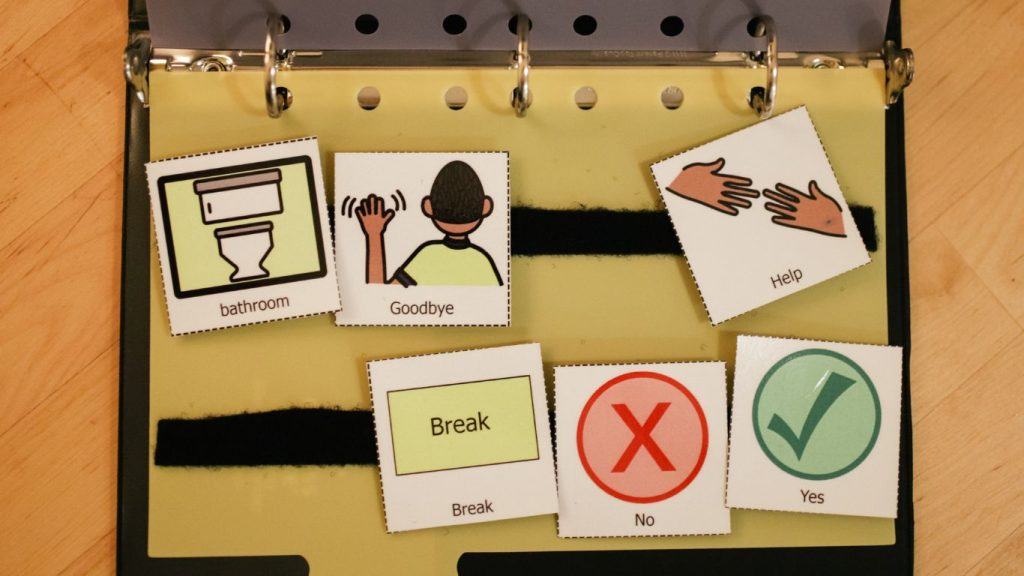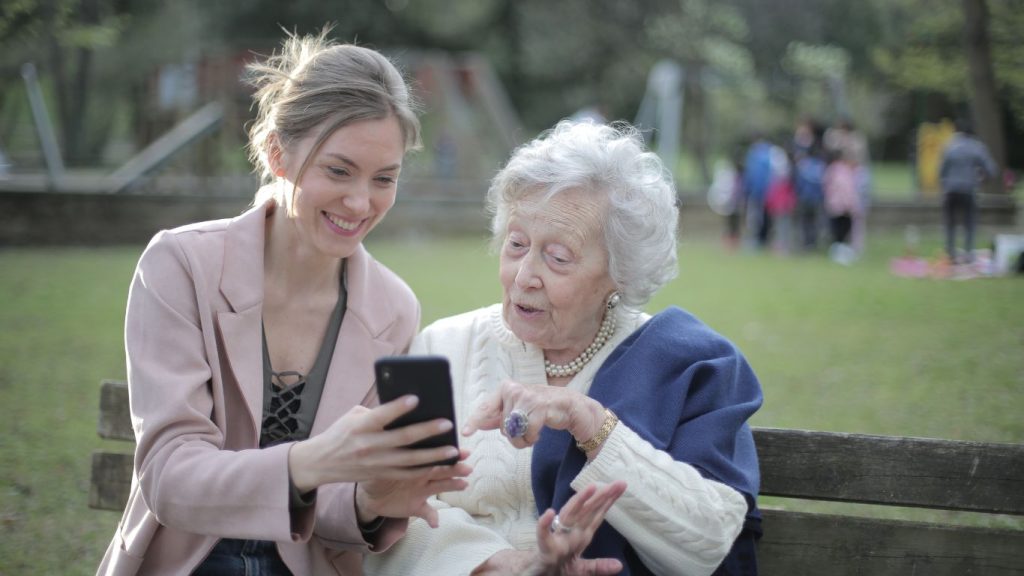Recently updated on January 20th, 2026 at 07:35 am
Dementia is a cumulative illness that, over time, will cause a Cognitive Decline. Meaning the ability to remember, understand, and communicate will be compromised.
As time goes on, the illness progresses, and the patient will slowly lose effective communication skills. Causing their ability to process information to become weaker and their responses delayed.
You’ll have to start discussions to get the person to make a conversation. This is common. Below are some methods that can help.
Communication strategies
 Many patients go through different stages of distress, anxiety, and possibly depression. Talking is a helpful way to handle these symptoms.
Many patients go through different stages of distress, anxiety, and possibly depression. Talking is a helpful way to handle these symptoms.
Start conversations with the person you’re looking after with empathy and understanding.
Remember, their age and health cause language impairment. Giving more attention to your conversations with them will help.
1) Prepare to communicate with a person with a cognitive decline
Plan enough time to spend with them. If you feel stressed, then take some time to calm down beforehand.
Think about how it would feel if you struggled to communicate, and try to remember what piqued their interests before the illness developed.
Recall previous conversations you had with them and what helped you to communicate well then. Use those to get ideas for things to talk about.
If it’s dementia causing them to start speaking in their first language, and you don’t speak it, then don’t worry. You can ask family members to translate for you. Or use a translation app.
Leveraging technology like digital portals and visual aids can also enhance communication, providing real-time updates and reducing barriers for multi-lingual families or those with sensory impairments.
2) Speak Clearly and Slowly, Using Short Sentences

Speak clearly and slowly, using short sentences and simple language, to improve comprehension for cognitive decline and hearing impairments.It can be helpful with dementia patients, especially if your loved one has trouble hearing.
Take your time with the conversation. Use simple, short sentences. Simplifying information and speaking in a manner that is easily understood is the best way to communicate with your elderly loved ones.
Be careful not to patronize them. Many people make this mistake because they speak similarly to children.
There’s a fine line between speaking with clarity and speaking like you’re speaking to a child. Patients with cognitive decline are primarily elderly and definitely won’t like it. It’ll give your already ill loved one more discomfort.
Speaking clearly and slowly with simple sentences is easier for dementia patients to understand, as it addresses cognitive decline and hearing challenges without focusing on pitch, which can vary.
3) Ask Questions
 Asking the elderly questions is one of the most valuable ways to connect with them. They’re also a great way to start and maintain a conversation.
Asking the elderly questions is one of the most valuable ways to connect with them. They’re also a great way to start and maintain a conversation.
You can ask your elderly relatives reminiscence questions to learn more about their life experiences.
Many seniors love to share life stories, and asking questions shows your loved one that you’re interested to hear what they have to say.
Asking questions gives patients opportunities to make choices for themselves.
Even if they’re facing physical health issues or cognitive decline, don’t make assumptions about what your loved one wants or needs. Give them opportunities to make decisions for themselves.
It’s essential that seniors are given levels of autonomy and independence. For example, instead of deciding what your loved ones are going to eat, ask them what they want.
If your loved one has trouble making a decision, then help them by providing a few choices. Regardless of anything, everyone wants to feel heard.
Incorporating open-ended questions and the teach-back method—where you gently ask the person to explain back what they understood—can further encourage engagement, ensure comprehension, and support their mental ability.
Non-Verbal Communication
 Communication includes more than talking. Movements, gestures, and facial expressions can all convey a person’s thoughts and help you get a message across.
Communication includes more than talking. Movements, gestures, and facial expressions can all convey a person’s thoughts and help you get a message across.
Sometimes, it takes time for elders to fully grasp what we’re saying and whether we’re safe to talk to.
When conversing with elders, it’s important to show patience and compassion. After all, living with an illness is tasking.
Body language and physical contact are significant when speech is difficult for a person with dementia. Try using the following methods to communicate.
1) Use a positive tone
 When speaking with others, your tone will convey meaning. A word like ‘Hi,’ can be taken in many different ways; all depending on the tone used to say it.
When speaking with others, your tone will convey meaning. A word like ‘Hi,’ can be taken in many different ways; all depending on the tone used to say it.
Even if our seniors can’t understand what we’re saying, the tone of voice may still reach them.
Keep your tone positive and friendly when possible. Speak to them at a distance to avoid intimidating them.
Positive tones can turn even negative feelings into positive ones and will help you build a better connection with them.
Speak to them in a tone that is neither too soft nor too loud. Focus on hints from your seniors, like facial expressions, to ensure your voice’s frequency isn’t causing them discomfort.
2) Listening and understanding
 Listening is an important trait in any conversation. Even more important for patients with cognitive decline.
Listening is an important trait in any conversation. Even more important for patients with cognitive decline.
Active listening is critical for building trust, reducing anxiety and depression, and improving communication with your loved one.
Use these subtle signs to show you’re listening.
● Use eye contact.
It shows interest and attentiveness to what is being said. Eye contact also encourages them to look at you when you’re talking to them.
Maintaining eye contact is essential when conversing, but be sure you aren’t scaring them.
● Don’t interrupt
Interrupting shows the other person that you aren’t interested in what they’re saying.
Even if you think you know what they’re going to say, cutting in may seem disrespectful to them. Especially after they put effort into finding the right words to say.
● Minimise Distraction
Seniors are more sensitive to sound than younger people. So, background noises may be distracting and make conversing difficult.
Minimizing background noise and distractions is essential for effective interaction with dementia patients, as it helps reduce sensory overload and improve comprehension, though always ensure you have permission to do so.
Additionally, giving them your full attention without distractions like in-between phone calls will make them feel acknowledged and help them enjoy talking to you even more.
3) Patience
The patients are going through one of the hardest times in their lives. Their cognitive decline and memory loss make conversing difficult. So, try to have patience.
Don’t rush them. Conversations with them will be at a different pace than what you’re used to. But there will be chatting.
It takes time for them to process information. Moving the conversation at your pace may confuse and discourage them from further conversing with you.
Keep the conversation focused on one topic at a time, and avoid asking multiple questions simultaneously.
They may mispronounce words or misremember how events happened. This is normal. Don’t make a big deal out of it, and keep the conversation going.
There will be moments of silence. Let them take those short bits to figure out what they want to say to you.
Similarities and Correlation Between Dementia and Alzheimer’s Disease
 Dementia
Dementia
Dementia is categorized as a severe decline in mental ability. It’s a term used to describe symptoms like decline in memory, reasoning, feelings, cognitive abilities, and other thinking capabilities.
The ailment is more widespread among seniors. However, it’s not a normal part of aging. But it is caused by damaged brain cells.
Alzheimer’s Disease
Alzheimer’s is caused by brain cell damage and is the most common cause of dementia.
The disease is caused by brain cell damage. Alzheimer’s disease leads to dementia-like symptoms that eventually worsen as time progresses.
Although aging is a risk factor for Alzheimer’s, it doesn’t make the disease a normal part of growing old.
As the illness progresses, symptoms get worse. Long-term Alzheimer’s can cause behaviour changes, disorientation, and struggle to speak, swallow, and walk.
Why Choose Professional Help for Patients with Cognitive Decline?
Both dementia and Alzheimer’s disease are severe conditions for anyone to go through.
Looking after people with dementia requires care, insight, and knowledge. While also having time and resources to provide the stimulation they need to remain as happy, engaged, and independent as possible.
Not everyone has the time, knowledge, and resources to provide the care their ailing elderly need. And that’s ok. There are several in-home Specialized Care For Seniors.
Many home care providers offer dementia and Alzheimer’s care, as well as personal care for seniors. That way, your loved ones will have opportunities to make new connections and have more people to share their time with.
Aside from more socializing, home care also provide all other necessities to keep your loved ones happy and healthy. That includes food, checkups, Medication Management, and Assistance with Daily Living.
Additionally, your loved ones will get 24/7 supervision from people specialized in nursing the elderly. They will also receive expert advice on how best to care for them.
Many home care services now adopt integrated care approaches that combine medical, behavioral, and social support, leading to higher satisfaction and better outcomes for dementia and Alzheimer’s patients through personalized communication and technology-enabled strategies.
Conclusion
Communication is an essential part of maintaining a healthy lifestyle. When conversing with patients who are going through a cognitive decline, you need to incorporate patience, empathy, and understanding.
People with dementia have barriers that make holding a conversation challenging. But that’s ok. Do your best to be there for them. Listen, talk, and simply avoid topics that may cause them distress.
Your efforts to be there for them emotionally are enough to comfort those who need it.

 Dementia
Dementia